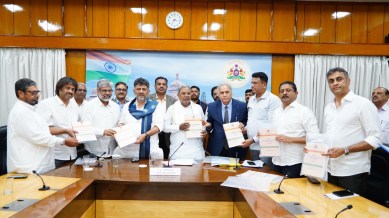Karnataka state education policy calls to scrap NCERT, proposes reservation in private institutions
Karnataka also plans to expand post-matric scholarships, raise income limits to Rs 10 lakh per annum, and establish a State Education Finance Corporation that will offer employment-linked education loans to low-income students.

The Karnataka State Education Policy Commission, headed by economist and former UGC Chairman Prof Sukhadeo Thorat, Friday formally submitted the report to Chief Minister Siddaramaiah. The commission has recommended several reforms in both school education and higher education tailored specific to Karnataka’s socio-cultural, linguistic and economic realities- independent of the National Education Policy (NEP) 2020.
School education
Under school education, in a major departure from NEP 2020, Karnataka plans to localize curriculum content, moving away from a reliance on NCERT textbooks and instead developing a Comprehensive Curriculum for School Education (CCSE). The state will also regulate private pre-primary schools through a separate framework and introduce a dedicated regulator for private schools in view of concerns linked to high admission fees, age restriction criteria among others.
monthly limit of free stories.
with an Express account.
Further, the report proposes a structural overhaul, replacing the NEP’s 5+3+3+4 model with a simplified 2+8+4 framework: two years of pre-primary, eight years of primary, and four years of secondary education. Notably, it mandates that Kannada or the mother tongue be the medium of instruction up to Class 5 across all school boards, including CBSE and ICSE, a step in line with NEP 2020. The latter recommends that the medium of instruction in schools should be the home language, mother tongue, local language, or regional language up to at least Grade 5, and preferably up to Class 8.
Karnataka’s model also introduces a two-language education policy, where Kannada or the mother tongue is taught alongside English, reflective of Siddaramaiah’s objection to three language policy citing ‘Hindi imposition’. Significantly, the commission also proposes increasing the education budget to 30 per cent of the state’s total expenditure, with a planned 5–10 per cent annual increase in per-student spending. It also recommends the establishment of the Karnataka State Open School System, designed to offer flexible learning options for dropouts and working students, and makes Constitutional Values Education a compulsory subject across all schools.
Higher Education
The policy has proposed a significant recommendation to extend the state’s reservation policy to private unaided institutions, including universities, deemed universities, and autonomous colleges. Citing Article 15 (5) of the Constitution, the commission has called for the implementation of SC/ST/OBC reservations in admissions within these institutions. The policy also recommends that all admissions in private institutions be brought under a transparent, merit-based and regulated framework, to safeguard against exclusion and ensure accountability.
Further, the commission departs from NEP’s uniform 4-year degree model by recommending a 3+2 structure for general education (3-year undergraduate + 2-year postgraduate) and a 4+2 model for professional programs. This maintains the state’s pre-NEP flexibility while still enabling interdisciplinary and modular learning. Postgraduate admissions will be opened up across state universities, and interestingly the policy also proposes bilingual teaching where Kannada (or another regional/mother tongue) is used alongside English in higher education institutions.
Further, the Commission proposes the identification of State Institutions of Excellence, along with a feasibility-based approach to opening new institutions. It mandates training for all new teachers to be provided through Higher Education Teachers Academy Centers in each department. The policy also recommends offering free higher education for girls across government, aided, and unaided institutions, with financial incentives to delay child marriage.
To improve research and innovation, a State Research Foundation with a seed fund of Rs 500 crore is proposed. Karnataka also plans to expand post-matric scholarships, raise income limits to Rs 10 lakh per annum, and establish a State Education Finance Corporation that will offer employment-linked education loans to low-income students.
In terms of governance and administration, the policy recommends merging parallel educational bodies under a single unified commissionerate, converting DSERT into an autonomous SCERT to lead curriculum innovation, and reducing the number of regional joint director offices from six to four. It also proposes district-level academic administration units led by educationists, the establishment of Foreign Students Cells in all universities, and the creation of a Karnataka State Quality Assessment Board to help institutions meet and exceed quality benchmarks.
Importantly, the policy mandates the filling of all sanctioned teaching posts within five years, and ensures that the vacancy gap remains below 5%. A recruitment model involving KEA-administered exams and university interviews is proposed for Assistant Professors, and a new selection process is outlined for college principals.
The Commission officially began its work on November 1, 2023, comprising 17 members, 6 advisors, and a member secretary. It established 35 task forces—16 for school education, 16 for higher education, and 3 for vocational education—engaging a total of 379 experts. These task forces held 132 meetings, and the Commission itself met 42 times, contributing nearly 2,775 man-days of academic and policy effort. The final report is spread across three volumes, consisting of 2,197 pages. The report is expected to be placed before the state cabinet for acceptance before implementation.